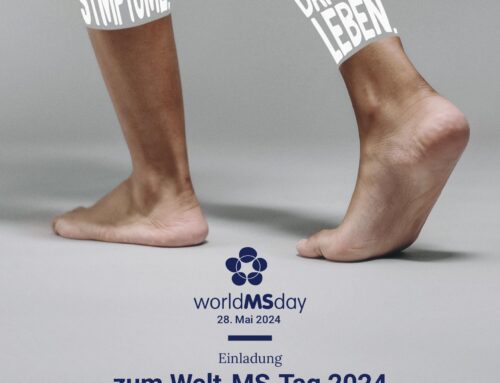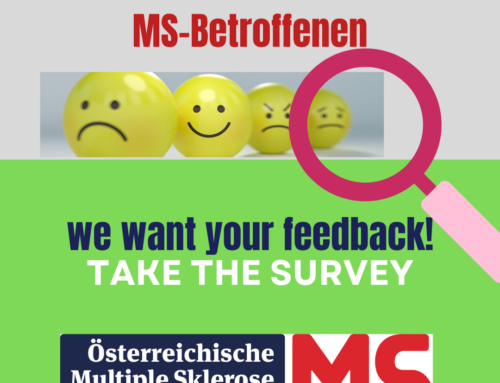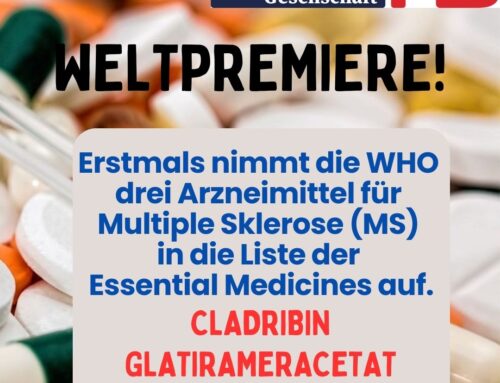ECTRIMS 2018: Berlin im Zeichen der Multiplen Sklerose
Von 10. bis 12. Oktober 2018 findet zum 34. Mal der jährliche Kongress des European Committee for Treatment and Research in Multiple Sclerosis (ECTRIMS) statt, zu dem rund 8.500 Teilnehmerinnen und Teilnehmer erwartet werden.
Beim 34. Jahreskongress des europäischen Komitees zur Behandlung und Erforschung der Multiplen Sklerose (ECTRIMS) treffen sich im City Cube Berlin Forschende, Neurologinnen und Neurologen sowie an Multipler Sklerose interessierte Medizinerinnen und Mediziner sämtlicher Fachrichtungen. Insgesamt werden 1.975 Studien und die neuesten Entwicklungen aus den Bereichen Epidemiologie, Pathologie, Bildgebung, Therapie, Immunologie, Genetik, Therapie und Biotechnologie vorgestellt.
Aus Österreich reisen Univ.-Prof. Dr. Thomas Berger, MSc, Univ.-Prof. Dr. Hans Lassmann, Univ.-Prof. Dr. Franz Fazekas, Univ.-Prof. Dr. Karin Zebenholzer, Univ.-Prof. PD Dr. Michael Khalil, PhD, Univ.-Prof. Dr. Christian Enzinger, Assoc. Prof. Priv.-Doz. Dr. Romana Höftberger, Assoc. Prof. Univ.-Doz. Dipl.-Biol. Dr. Monika Bradl, Univ.-Prof. Dr. Markus Reindl, Margarete Voortman, MSc., OA Dr.Michael Guger, Livia Hofer, MSc, Dr. Alexander Pichler, Dr. Julia Feige, Dr. Christian Bsteh, Dipl.-Ing. Lukas Pirpamer und viele andere Forscherinnen und Forscher an.
Programm
Mittwoch, 10. Oktober 2018 |
|||
|---|---|---|---|
| Hot Topic 1: Hot topics in MS neuropathology | 08:00-08:45 | ||
| Educational Session 1: Pregnancy management in MS | 08:00-09:30 | ||
| Educational Session 2: Practical treatment recommendations based on new guidelines in MS | 08:00-09:30 | ||
| Educational Session 3: Neurofilament light chains in MS: where do we stand, the long road to clinical application | 08:00-09:30 | ||
| Educational Session 5: Impact and management of comorbidities in MS | 08:00-09:30 | ||
| Educational Session 4: Immunology of MS | 08:00-09:30 | ||
| Hot Topic 2: Digital MS: improving data acquisition and analysis | 08:55-09:40 | ||
| Young Scientific Investigators‘ Session 1: Imaging | 09:00-10:15 | ||
| Hot Topic 3: Biosimilars and follow-ups | 09:45-10:30 | ||
| Hot Topic 4: New approaches for microscopic and macroscopic imaging | 09:45-10:30 | ||
| Hot Topic 5: Mechanisms of CNS autoimmunity | 09:45-10:30 | ||
| Case-based Educational Session 6: How to manage non-response to highly active (second line) drugs? | 09:45-10:30 | ||
| Case-based Educational Session 7: Progressive MS: who should be treated and how to monitor treatment response? | 09:45-10:30 | ||
| Case-based Educational Session 8: Should all MS patients be treated? | 09:45-10:30 | ||
| Plenary Session 1: Welcome and ECTRIMS Lecture | 11:00-12:15 | ||
| Satellite Symposium 1: Data • Analysis • Technology • Application developments on the frontiers of MS | 12:30-13:30 | ||
| Satellite Symposium 2: THC: CBD in multiple sclerosis spasticity symptoms: newest evidence confirming efficacy and safety | 12:30-13:30 | ||
| Scientific Session 1: How real world data can inform treatment decisions | 13:30-15:00 | ||
| Scientific Session 2: Paediatric MS | 13:30-15:00 | ||
| Educational Session 9: Clinical trials in MS: the need for novelty | 13:30-15:00 | ||
| Educational Session 10 (IMSCOGS): Innovation in MRI in relation to cognitive and neuropsychiatric phenomena in MS | 13:30-15:00 | ||
| Educational Session 11: Molecular mechanisms of tissue injury in cortical MS lesions | 13:30-15:00 | ||
| European Charcot Foundation Symposium: Towards imaging biomarkers for disease progression in MS | 13:45-14:45 | ||
| Young Scientific Investigators‘ Session 2: Immunology/Neurobiology | 13:45-15:00 | ||
| Nurses‘ Session 1: Digital solutions | 13:45-15:00 | ||
| Scientific Session 3: Risk management with MS therapies | 15:30-17:00 | ||
| Burning Debate: The new McDonald diagnostic criteria are controversial making them difficult to use in clinical practice | 15:30-17:00 | ||
| Scientific Session 4 (IMSCOGS): Cognition in MS | 15:30-17:00 | ||
| Young Scientific Investigators‘ Session 3: Clinical | 15:30-16:45 | ||
| Nurses‘ Session 2: MS Nursing around the world | 15:30-16:45 | ||
| Educational Session 12: MS mimicks: other neuro-inflammatory disorders | 15:30-17:00 | ||
| Educational Session 13: Genetics and biomarkers in MS | 15:30-17:00 | ||
| Educational Session 14: Myelin repair in MS | 15:30-17:00 | ||
| Poster Session 1 | 17:00-19:00 | ||
| Satellite Symposium 3: Disease activity: can starting early with effective treatment offer better outcomes in MS? | 18:15-19:15 | ||
| Satellite Symposium 4: Committing to generations, impacting patients: advancing disease management across the continuum of MS | 18:15-19:15 | ||
Donnerstag, 11. Oktober 2018 |
|||
|---|---|---|---|
| Satellite Symposium 5: Disease progression: changing how we think about MS | 07:30-08:30 | ||
| Educational Session 15: Disease modifying treatments in MS | 08:00-09:30 | ||
| Educational Session 16 (RIMS): Symptomatic treatment of MS: how to manage pain/bladder/bowel/sexual dysfunction? | 08:00-09:30 | ||
| Free Communications 1: New diagnostic criteria | 08:30-09:30 | ||
| Free Communications 2: Clinical | 08:30-09:30 | ||
| Free Communications 3: Neuroimmunology | 08:30-09:30 | ||
| Scientific Session 5: Predicting the course of newly diagnosed patients: insights from cohorts | 10:00-11:30 | ||
| Scientific Session 6: VISION research in MS: state of the art and future prospects | 10:00-11:30 | ||
| Scientific Session 7: Environmental risk factors of MS | 10:00-11:30 | ||
| Educational Session 17: MS pathology for clinical neurologists | 10:00-11:30 | ||
| Educational Session 18: Experimental neuroimmunology | 10:00-11:30 | ||
| Meet the Expert 1: Clinical treatment issues in NMO | 10:00-11:00 | ||
| Hot Topic 6: „Hitting hard and early“ or stepwise escalation: What is the best strategy? | 11:45-12:30 | ||
| Hot Topic 7: Imaging of neuronal structure and function to understand disease progression | 11:45-12:30 | ||
| Hot Topic 8: Emerging high throughput technologies: challenges and opportunities | 11:45-12:30 | ||
| Hot Topic 9: Science & art of symptomatic treatment | 11:45-12:30 | ||
| Case-based Educational Session 19: Paediatric MS | 11:45-12:45 | ||
| Meet the Expert 2: Differential diagnosis | 12:00-13:00 | ||
| Satellite Symposium 6: Evolving MS treatment with immune reconstitution therapy | 13:00-14:00 | ||
| Satellite Symposium 7: Committing to patients, impacting individuals: towards an individualised approach for patients with MS | 13:00-14:00 | ||
| Scientific Session 8: When to start and when to stop immunomodulatory treatment in MS | 14:15-15:45 | ||
| Scientific Session 9: Neuromyelitis optica spectrum disease (NMOSD) | 14:15-15:45 | ||
| Scientific Session 10: Hunting for new targets to fight neurodegeneration | 14:15-15:45 | ||
| Educational Session 20 (MAGNIMS): MRI and the diagnosis of multiple sclerosis | 14:15-15:45 | ||
| Educational Session 21 (RIMS): Symptomatic treatment of MS: how to manage fatigue and gait dysfunction? | 14:15-15:45 | ||
| Meet the Expert 3: Treatment | 14:15-15:15 | ||
| Free Communications 4: Treatment | 16:15-17:15 | ||
| Free Communications 5: Imaging | 16:15-17:15 | ||
| Free Communications 6: Immunology/Neurobiology | 16:15-17:15 | ||
| Hot Topic 10: Access to and restrictions in MS therapy across countries | 16:15-17:00 | ||
| Case-based Educational Session 22: MOG-Ab phenotype | 16:15-17:15 | ||
| Meet the Expert 4: Pregnancy | 16:15-17:15 | ||
| Poster Session 2 | 17:15-19:15 | ||
| Satellite Symposium 8: Brain volume loss and biomarkers: how will new research change the clinical management of MS? | 18:15-19:15 | ||
| Satellite Symposium 9: Combining DMT: a potential way forward for RMS* | 18:15-19:15 | ||
Freitag, 12. Oktober 2018 |
|||
|---|---|---|---|
| Satellite Symposium 10: Treatment sequencing in MS: how do you choose the right DMD for your patient? | 07:30-08:30 | ||
| Scientific Session 11: Approaches for tackling treatment failure | 08:30-10:00 | ||
| Scientific Session 12: Recent development in imaging for treatment monitoring | 08:30-10:00 | ||
| Scientific Session 13: Robotic and telehealth supported rehabilitation and exercise training in MS | 08:30-10:00 | ||
| Educational Session 23: NMO-spectrum disorders: current concepts and clinical management | 08:30-10:00 | ||
| Educational Session 24: The use of stem cells in MS: where are we and where are we going? | 08:30-10:00 | ||
| Scientific Session 14: Recent developments in progressive MS | 10:30-12:00 | ||
| Scientific Session 15: „MS spectrum disease“? | 10:30-12:00 | ||
| Scientific Session 16: Understanding MS by integrating clinical and multiOMICs data | 10:30-12:00 | ||
| Educational Session 25: MS mimicks: genetic disorders | 10:30-12:00 | ||
| Educational Session 26 (MAGNIMS): From structural and functional connectivity to clinical impairment in multiple sclerosis | 10:30-12:00 | ||
| Google Hangout | 12:00-13:00 | ||
| Poster Session 3 | 12:15-14:15 | ||
| Satellite Symposium 11: Switching MS treatments: patient trajectory, prior response and real world evidence to inform decision-making | 13:00-14:00 | ||
| Satellite Symposium 12: Data • Analysis • Technology • Application making it real | 13:00-14:00 | ||
| Scientific Session 17: Late Breaking News | 14:15-15:30 | ||
| Plenary Session 2 – ECTRIMS Awards, ECTRIMS Honorary Members, Confavreux Lecture and ECTRIMS 2018 Highlights | 16:00-18:00 | ||
Kerstin Huber-Eibl, MS-Gesellschaft Wien





